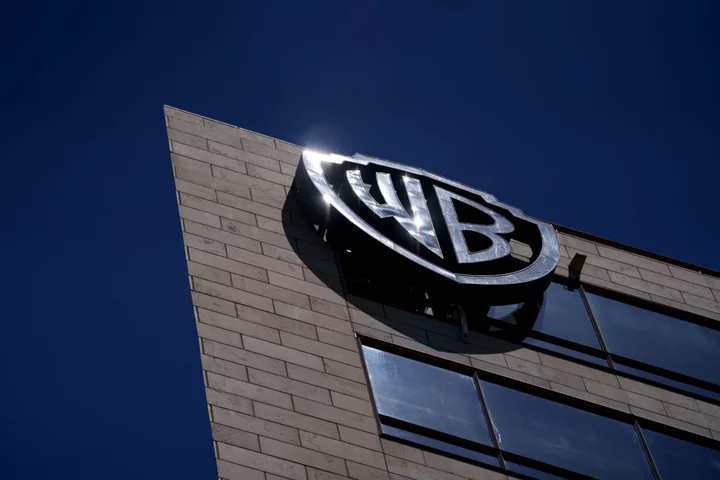Warner Bros. Discovery Inc. tumbled the most in more than a year after the entertainment giant reported a significant decline in network advertising as a result of the Hollywood strikes and the ongoing bleeding of traditional TV subscribers.
Advertising revenue in the networks division fell 12% to $1.7 billion in the third quarter, the company reported Wednesday. The hit weighed on profitability and led to a loss of 17 cents a share in the three months ended in September, missing Wall Street estimates of an 8.6-cent loss, according to data compiled by Bloomberg.
The shares fell as much as 15% to $9.82 as trading opened in New York on Wednesday, the biggest intraday decline since August 2022. They had gained 22% this year through Tuesday’s market close.
Warner Bros., one of the industry’s biggest content generators, has been balancing a shift in its focus to streaming TV while keeping a close eye on ad-dependent core networks such as CNN and TNT.
Warner Bros.’ direct-to-consumer unit, which includes the Max streaming service, reported a surprise profit with adjusted earnings of $111 million before interest, taxes, depreciation and amortization in the three months ended in September. Analysts had been expecting a loss of $125 million.
Subscribers to the company’s streaming services declined as Warner Bros. has been shifting programming from its Discovery+ service to Max, prompting many customers to cancel. Total subscribers to the streaming service unit fell by 1 million to 52.6 million.
New York-based Warner Bros. follows other media companies like Paramount Global in reporting narrowing losses in streaming as cost cutting and the twin strikes by actors and screenwriters limited spending on new films and TV shows. Media companies have also been raising prices on their streaming services and introducing new ad-supported plans to boost revenue in those businesses. Revenue in the streaming unit was up 5% to $2.44 billion.
Profitability in the streaming business was “reassuring,” according to Bloomberg Intelligence analyst Geetha Ranganathan. She said it’s “well on its way to becoming a sustainable, long-term earnings growth driver.” Overall revenue trends remained “a bit choppy,” however, due to the decline in TV ads, she said. Warner Bros reported sales of $9.98 billion, in line with the average analyst forecast.
The Barbie movie was of course a bright spot. The highest grossing film in the company’s history helped compensate for weak advertising at the company’s traditional TV networks and, along with other titles, increased theatrical revenue significantly, according to the company.
(Updates shares)









